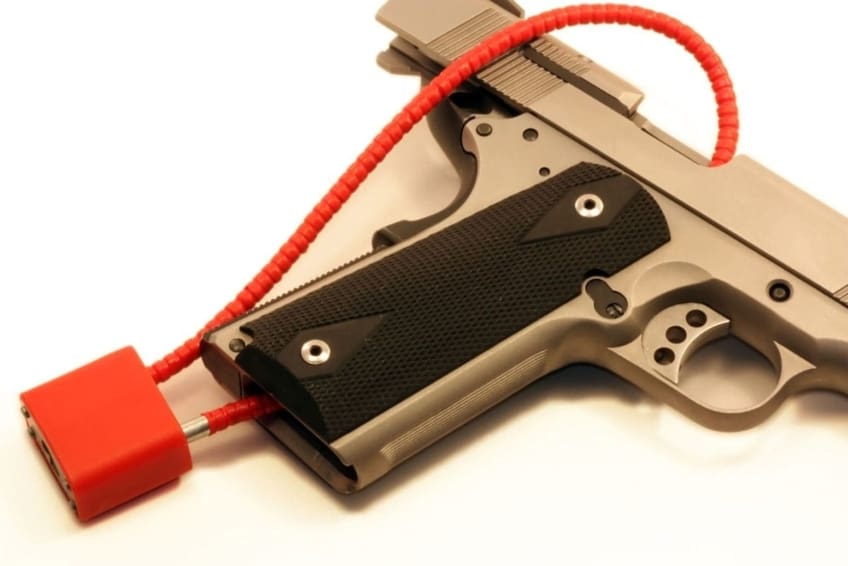
Keeping firearms in the home comes with serious responsibilities, especially when children are present. Following gun safety tips for families can help prevent accidental injuries, reduce the risk of suicide, and ensure everyone in your home understands how to stay safe around guns. Whether you own a firearm or your child visits homes where guns may be present, it’s important to take steps to protect your family.
How to talk to your children about gun safety in and outside the home
Stories about gun violence and accidents are routinely in the news. Even if you do not own a gun, you probably know someone who does. Before your children visit another home, ask the adults if there is a gun in the house. This includes the homes of friends, relatives, or even a babysitter. If they do have a gun in the house, ask whether it is unloaded and properly locked away. This may feel like an awkward conversation, but it’s important to put your child’s safety first.
If you have a gun in your home, be sure to educate your children. Take all precautions. Talk to your children often about what to do if they find a gun, even if they are not sure whether it is real or a toy. Teach them to remember these words and actions if they see a gun:
- Stop!
- Don’t touch!
- Go away!
- Tell an adult!
Be sure your children know that it is very important to leave the area where the gun is so that they won’t be hurt accidentally by someone else. Tell them that there is a safe way to use guns, but it demands a trusted adult be with them.
What should I do to protect my family from injury if I own a gun?
Children are curious and like to explore. If there is a gun in your home, simply hiding it is not enough. Keep it:
- Unloaded
- Locked away
The bullets should be locked away in a separate location. Only responsible adults should have access to the keys. The gun and bullets should be stored out of reach of your children and their friends. Also, keep the gun and bullets safe from family members who:
- Are actively and seriously depressed
- Are abusive to others
- Who abuse drugs (including alcohol)
- Who have dementia
When you are handling or cleaning a gun, assume that it is loaded. Never leave it unattended.
Gun safety tips for families: Teaching kids about toy guns, video games, and media violence
Children who play violent video games or watch violent TV shows and movies may have trouble understanding that violence in real life actually hurts people. Some parents choose not to allow their children to watch violent TV shows, play violent video games, or play with toys that are pretend weapons.
This is a personal choice. It is important to talk to your children often about the difference between real violence and violence on TV and in games and movies. Even if you don’t allow your children to have toy guns, their friends may have them. Explain to your children that in real life, guns can hurt and kill people.
Guns in the home: Suicide Risk, teen safety, and community violence
Research has shown that guns are used in a staggering number of teen suicides. Having a gun in the home increases the risk for teen suicide. Teens who are angry or depressed are more likely to kill or harm themselves if they can easily get a gun. Also, teens often act without thinking first. It’s best not to have a gun in your home at all if someone who lives there is depressed, troubled, or thinking of suicide.
Easy access to guns at home also contributes to school and community violence.
When to see a doctor for gun safety concerns in the family
Some teenagers experience depression. How can you know if your teenager is seriously depressed? Look for changes in your teen’s attitude, schedule, and circle of friends. If your teen seems more tired, is withdrawing from friends, and is often irritable, it could be depression. If you are worried, take your teen to see their doctor. The doctor can rule out any medical problems. They can also refer you to a counselor or psychologist, if needed.
Questions to ask your doctor about gun safety tips for families
- What if my son or daughter is the product of a split household (divorce) and the co-parenting is not amicable? How do I enforce gun safety in the other house?
- Do I really need to hide my gun? Why can’t I just instruct my child not to go near it?
- Wouldn’t teaching my child how to safely handle a gun be better than hiding it and hoping my child doesn’t find it?
- How old should my children be before I can stop hiding my guns?
Resources
Centers for Disease Control and Prevention (CDC): About School Violence
National Institutes of Health, MedlinePlus: Gun Safety
National Institutes of Health, MedlinePlus: Recognizing Teen Depression
![]()
Copyright © American Academy of Family Physicians
This information provides a general overview and may not apply to everyone. Talk to your family doctor to find out if this information applies to you and to get more information on this subject.







